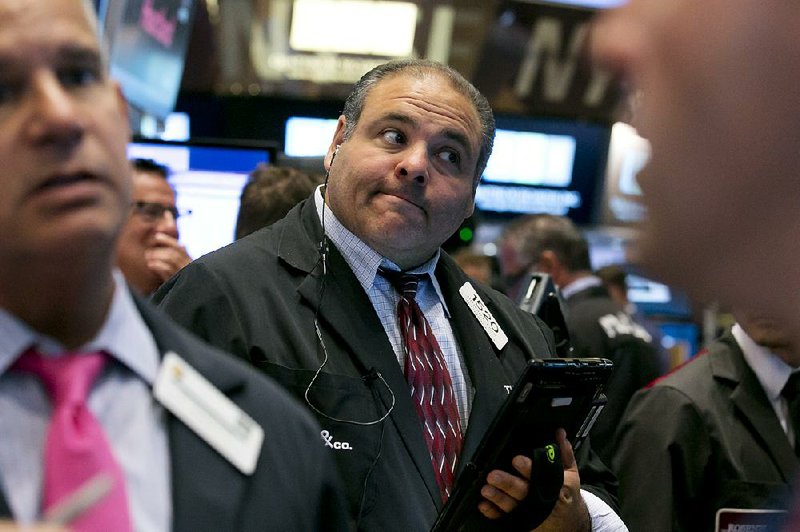BEIJING -- China on Tuesday devalued its currency nearly 2 percent, a move that hurts U.S. manufacturers that want to sell to China and makes U.S. goods more expensive in relation to Chinese imports, widening an already-large trade deficit.
The currency weakened another 1.6 percent this morning as the central bank stuck to its plan to give market forces more sway in determining the exchange rate.
Economists say the decisions by China's central bank are a sign of concern in Beijing that the world's second-largest economy is falling short of its goal of roughly 7 percent growth this year.
The move Tuesday unnerved global investors. U.S. stocks tumbled Tuesday, with the Dow Jones industrial average closing down 212 points. Shares of companies that derive a large part of their sales from China, such as Apple Inc. and Yum Brands, fell sharply. European markets were mostly lower. Germany's DAX lost 2.7 percent. Britain's FTSE 100 shed 1.1 percent.
In recent years, China has worked to let the value of the currency, known as the yuan or renminbi, rise, but the decision is likely to reignite debate over whether the country is giving an unfair advantage to its businesses.
China doesn't let its currency trade freely in financial markets as the United States does. Instead, it links the yuan's value to the U.S. dollar. Then it restricts trading to a band 2 percent above or below a daily target set by the People's Bank of China. On Tuesday, the central bank set the target 1.9 percent below Monday's level -- the biggest one-day change in a decade.
The yuan was valued at 6.32 per dollar on Tuesday, compared with 6.21 per dollar on Monday.
The currency this morning weakened 1.6 percent to 6.43 per dollar. Although the People's Bank of China said there's no economic basis for a continuous fall, policymakers reduced the daily target today by 1.6 percent -- in line with a pledge to align it more closely with the the previous day's closing level.
"Two percent is no big deal," said Mark Zandi, chief economist at Moody's Analytics, said Tuesday. "Ten percent over the next few months would be a big deal."
While the government believes the devaluation may help revive growth in China, for now it shows how concerned the Chinese authorities are about an economic slowdown, and that there may be further pain ahead for international companies operating there.
China's economic growth has been healthy compared with most countries but far below the double-digit pace it has enjoyed for decades. The country's Communist Party leaders fear that growth below that pace will raise the unemployment rate and possibly lead to social unrest.
The devaluation represents a dilemma for the Obama administration. The U.S. Treasury has tried to use quiet diplomacy in recent years to encourage China to free up its currency policies, while blocking efforts in Congress to punish China for major intervention in currency markets over the past decade to slow the rise of the renminbi.
Many in Congress have long accused China of unfairly building up its manufacturing sector at the expense of American jobs by undervaluing the renminbi, and the Chinese devaluation could fan those criticisms.
"For years, China has rigged the rules and played games with its currency," said Sen. Chuck Schumer, a New York Democrat. "Rather than changing their ways, the Chinese government seems to be doubling down."
Sen. Rob Portman, an Ohio Republican, said the devaluation "is another harsh reminder that we cannot afford to sit idly by as China refuses to play by the rules." Michigan Rep. Sander Levin, the top Democrat on the House Ways and Means Committee, which has jurisdiction on currency matters, said it's important to note that China "is increasingly intervening in its stock market and other markets."
The Treasury Department's response was more measured.
"While it is too early to judge the full implications of the change ... China has indicated that the changes announced today are another step in its move to a more market-determined exchange rate," a department statement said.
China's central bank said the yuan's devaluation was a result of reforms intended to make its exchange rate more market-based.
A close peg between the dollar and the yuan has hurt Chinese exporters by keeping their goods expensive overseas, thereby threatening jobs in key manufacturing industries. Exports in July plummeted by an unexpectedly steep 8.3 percent from a year earlier.
The U.S. trade gap with China narrowed to $28.9 billion in June from $30.6 billion in May and remains the largest with any single country, the Commerce Department said earlier this month.
"The move signals that [China] is willing to use all available tools, including a weaker currency, to prop up exports and its domestic economy," said Eswar Prasad, an international economist at Cornell University.
Yet many economists cautioned against seeing Beijing's move mainly as an effort to benefit its exporters at the expense of overseas competitors. They note that China's currency, left to market forces alone, would have declined in value in recent months.
"It is a small step forward to accommodating market forces," said Sung Won Sohn, an economics professor at the California State University's Smith School of Business.
China becomes the third major economy to act to lower its currency value. Initiatives by Japan and the European Union over the past two years depressed the yen and euro.
Those moves contrast with action foreseen from the U.S. Federal Reserve, which is expected to raise the short-term interest rate it controls later this year. A Fed rate increase would likely raise the value of the dollar, which has already jumped about 14 percent in value in the past 12 months against a basket of foreign currencies.
The rising dollar has hurt U.S. exporters by making their goods costlier abroad, and China's move to devalue its currency could further complicate the Fed's decision on when to raise rates. By making Chinese goods comparatively cheaper in the United States, a weaker yuan would push already-low U.S. inflation even lower.
The Fed wants to be "reasonably confident" that inflation is returning to its 2 percent target before raising rates. U.S. inflation has risen just 1.3 percent in the past 12 months.
UBS economist Tao Wang said Chinese officials would likely move cautiously, but investor expectations of further weakening "could quickly become entrenched" and cause the yuan to "depreciate quite quickly and significantly."
Shares of Yum Brands, the owner of the KFC and Taco Bell chains, were among the biggest decliners Tuesday in New York. The fast-food company gets more than half of its sales from China. The company said last month that it was expecting a strong second-half of the year in China. The shares fell $4.28, or 4.9 percent, to $83.54.
Apple, another company that makes a lot of money in China, dropped $6.23, or 5.2 percent, to $113.49 and Wynn Resorts, which generates more than half of its revenue from the Chinese gambling hub of Macau, slipped $2.39, or 4.3 percent, to $54.36.
Foreign automakers and parts companies working in China had enjoyed a long boom until the nation's new-car market contracted in June for the first time in more than two years. The devaluation may add another hit to earnings when those companies repatriate those profits, Bloomberg Intelligence analyst Kevin Tynan said in an interview.
Delphi, BorgWarner Inc. and Lear Corp. are among the most exposed parts-makers in China, and Tynan said they could face problems if the currency stays devalued for long. "The longer it goes, the worse it is," he said.
For industrial companies, the devaluation is another head wind on earnings, adding to slow global growth, lower oil and gas investment and sluggish consumer demand.
"It's a cumulative effect in an already difficult environment," said Karen Ubelhart, an analyst with Bloomberg Intelligence. Emerson Electric Co., mining equipment maker Joy Global Inc. and engine producer Cummins Inc. have among the highest sales attributed to China, she said. All three stocks fell Tuesday, including a drop of as much as 6 percent for Joy Global.
Information for this article was contributed by Ana Swanson of The Washington Post, by Neil Gough and Keith Bradsher of The New York Times; by Joe McDonald, Paul Wiseman, Christopher S. Rugaber and Steve Rothwell of The Associated Press; and by Phil Serafino, Mathieu Rosemain, Thomas Black, Kasia Klimasinska, Jeanna Smialek and staff members of Bloomberg News.
A Section on 08/12/2015

